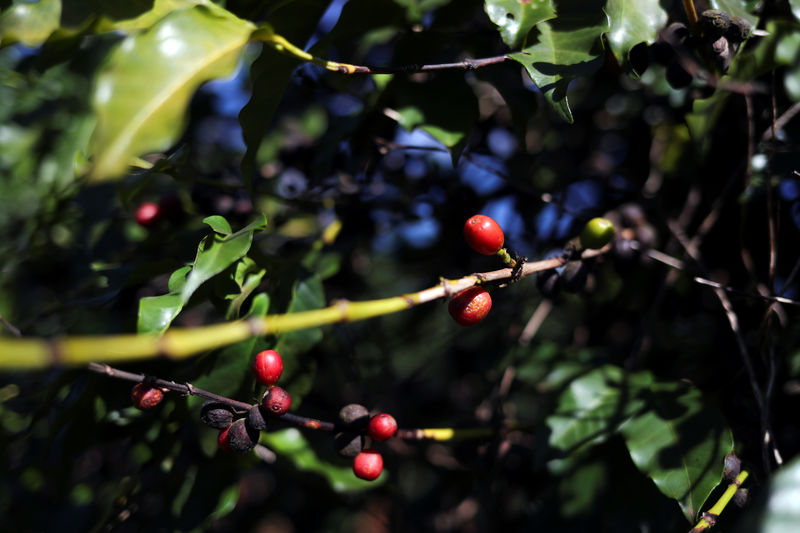By Maytaal Angel and Marcelo Teixeira
LONDON/SAO PAULO (Reuters) - Brazil is producing less top quality coffee this year despite a bumper crop overall because of unusual pre-harvest weather, burning some traders counting on the beans, said industry sources.
The market for Brazilian fine cup arabicas is tighter than normal, causing a premium for the origin over New York futures, which is particularly rare this time of the year, said traders, who requested anonymity to discuss the market-sensitive matter.
"Some trade houses are scavenging the market. Those coffees are trading at a premium to New York and it's only July. It's going to be a long, painful season for these folks," said a London-based trader.
That trader said Brazilian fine cups for August shipment are trading 4 cents above New York futures, when they normally trade between 5 cents and 9 cents below the reference contract.
Some trading houses that sold forward Brazilian fines expecting historical negative differentials at delivery time are now forced to buy at a premium, taking losses to fill contracts.
Long gaps between flowerings in Brazil raised red flags about the quality of the current crop, as Reuters reported in May, but the issue may be worse than many expected.
Brazilian exporter Escritório Carvalhaes said trading was unusually quiet at the moment, at the peak of the harvest.
"We haven't seen a week like this in a long time. The market is in a buying mood, but producers are not willing to sell. They are worried about the size and the quality of the crop," the trader said in a note to clients late on Friday.
"Weather was bad near harvest time. Out-of-season rains caused cherries to drop, reducing overall quality. The volume of pulped naturals will be very small," Carvalhaes said.
Producer Daniella Pelosini, a regular supplier of Italian roaster Illy, said she will struggle to produce a lot of pulped naturals – a bean prepared from belled mature, red cherries, which top quality brands seek.
"We are not sure what happened, but beans went quickly from green to dry. I'm finding it really difficult to make volumes of cherries for the pulped lots," she said during a visit to her farm in Pardinho, Sao Paulo state.
"It is a very atypical year", she said, estimating that 15% to 20% of her production will be pulped naturals, compared with 35% in a normal year.
One side effect of the issue will be larger output of lower quality coffees, weaker cups and types Rio or Riado, which many roasters use for blending. For farmers who are already facing historically low prices, the additional knock of selling lower quality will only add to the pain.
Coffee producers in Peru and Honduras are benefiting from the Brazilian quality shortfall, fetching between 5 cents and 10 cents over futures, according to the London-based trader. Those origins normally trade level with futures.

The trader said futures in New York could be affected if buyers start turning to exchange stocks, which are not perfect substitutes but are washed arabicas at least.